Compassionate Care in Nursing: Barriers, Enablers, and Reflections
VerifiedAdded on 2022/08/20
|7
|1951
|21
Report
AI Summary
This report critically examines compassionate care within healthcare, focusing on the nursing profession's role. It explores the significance of compassionate care, highlighting its impact on patient well-being and the provision of quality healthcare. The report identifies key barriers to compassionate care, such as religious and cultural concerns, contextual environment challenges including workload and nursing shortages, and sociocultural issues like gender and language differences. It also discusses enablers like role models and the development of emotional intelligence. The report includes reflections on clinical situations, particularly those involving palliative care, and emphasizes the importance of resilience and resources for nurses, including leadership, mentorship, and access to evidence-based practices and publications. Ultimately, the report underscores the essential role of compassionate care in improving patient outcomes and fostering a supportive healthcare environment.
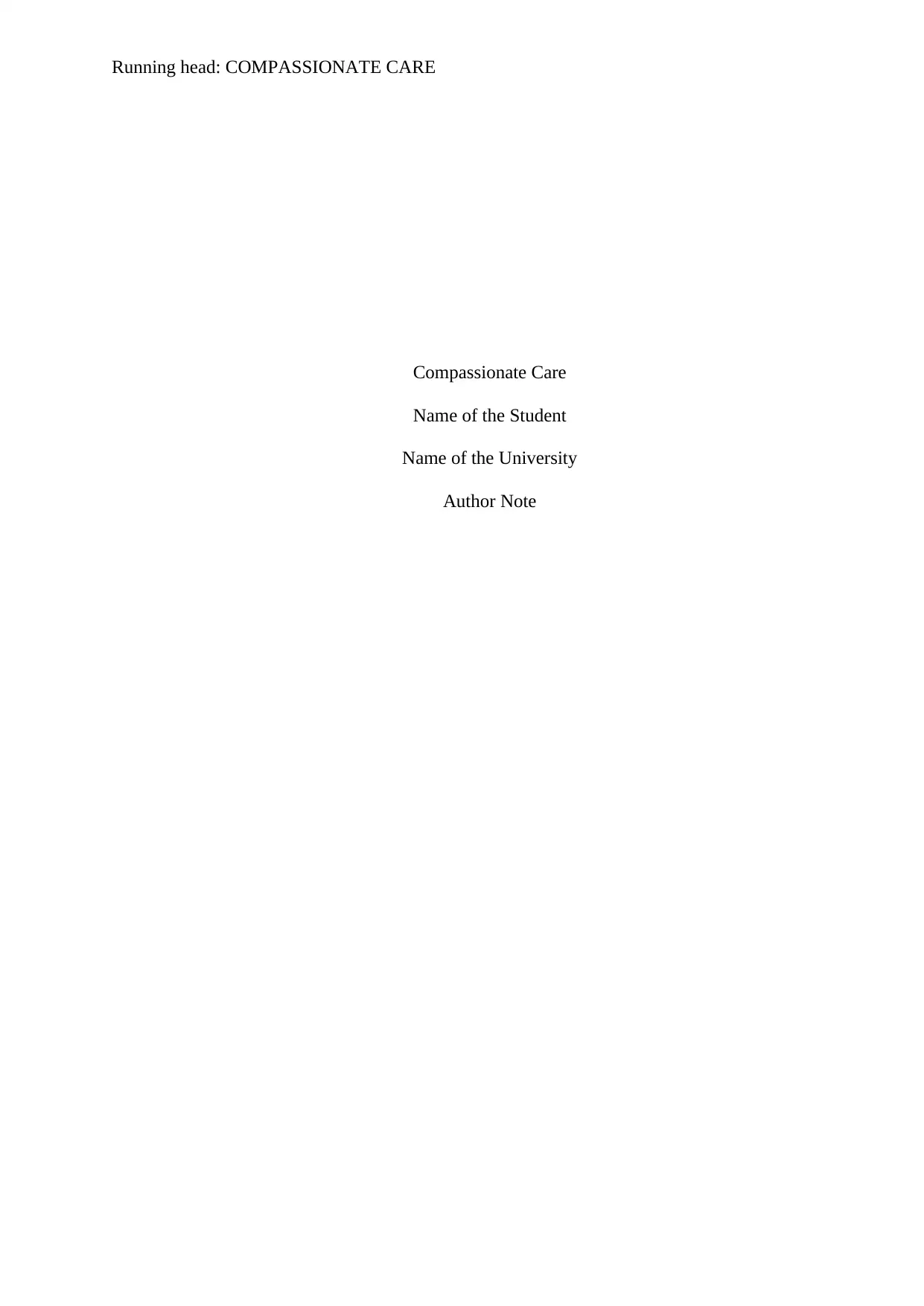
Running head: COMPASSIONATE CARE
Compassionate Care
Name of the Student
Name of the University
Author Note
Compassionate Care
Name of the Student
Name of the University
Author Note
Paraphrase This Document
Need a fresh take? Get an instant paraphrase of this document with our AI Paraphraser
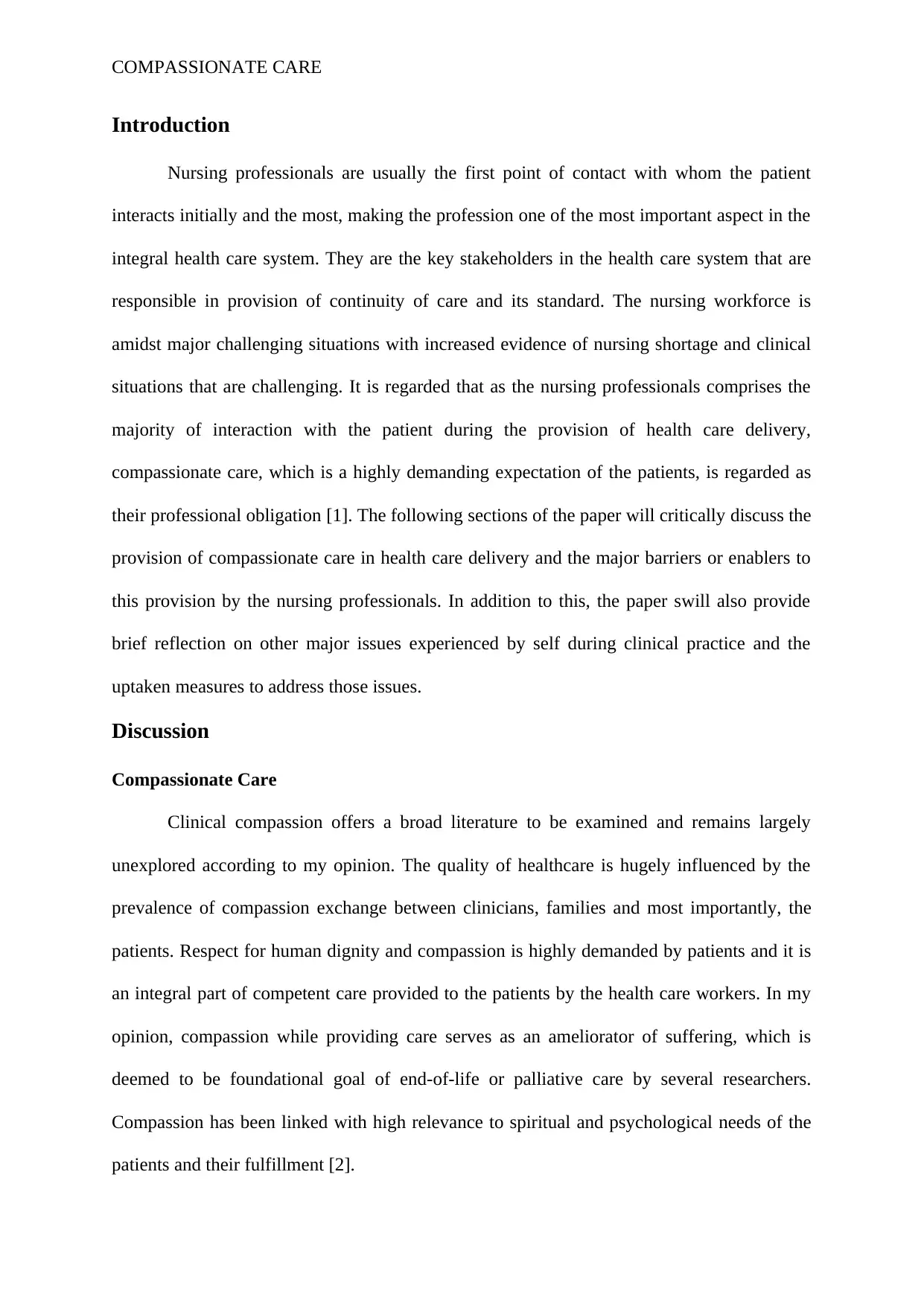
COMPASSIONATE CARE
Introduction
Nursing professionals are usually the first point of contact with whom the patient
interacts initially and the most, making the profession one of the most important aspect in the
integral health care system. They are the key stakeholders in the health care system that are
responsible in provision of continuity of care and its standard. The nursing workforce is
amidst major challenging situations with increased evidence of nursing shortage and clinical
situations that are challenging. It is regarded that as the nursing professionals comprises the
majority of interaction with the patient during the provision of health care delivery,
compassionate care, which is a highly demanding expectation of the patients, is regarded as
their professional obligation [1]. The following sections of the paper will critically discuss the
provision of compassionate care in health care delivery and the major barriers or enablers to
this provision by the nursing professionals. In addition to this, the paper swill also provide
brief reflection on other major issues experienced by self during clinical practice and the
uptaken measures to address those issues.
Discussion
Compassionate Care
Clinical compassion offers a broad literature to be examined and remains largely
unexplored according to my opinion. The quality of healthcare is hugely influenced by the
prevalence of compassion exchange between clinicians, families and most importantly, the
patients. Respect for human dignity and compassion is highly demanded by patients and it is
an integral part of competent care provided to the patients by the health care workers. In my
opinion, compassion while providing care serves as an ameliorator of suffering, which is
deemed to be foundational goal of end-of-life or palliative care by several researchers.
Compassion has been linked with high relevance to spiritual and psychological needs of the
patients and their fulfillment [2].
Introduction
Nursing professionals are usually the first point of contact with whom the patient
interacts initially and the most, making the profession one of the most important aspect in the
integral health care system. They are the key stakeholders in the health care system that are
responsible in provision of continuity of care and its standard. The nursing workforce is
amidst major challenging situations with increased evidence of nursing shortage and clinical
situations that are challenging. It is regarded that as the nursing professionals comprises the
majority of interaction with the patient during the provision of health care delivery,
compassionate care, which is a highly demanding expectation of the patients, is regarded as
their professional obligation [1]. The following sections of the paper will critically discuss the
provision of compassionate care in health care delivery and the major barriers or enablers to
this provision by the nursing professionals. In addition to this, the paper swill also provide
brief reflection on other major issues experienced by self during clinical practice and the
uptaken measures to address those issues.
Discussion
Compassionate Care
Clinical compassion offers a broad literature to be examined and remains largely
unexplored according to my opinion. The quality of healthcare is hugely influenced by the
prevalence of compassion exchange between clinicians, families and most importantly, the
patients. Respect for human dignity and compassion is highly demanded by patients and it is
an integral part of competent care provided to the patients by the health care workers. In my
opinion, compassion while providing care serves as an ameliorator of suffering, which is
deemed to be foundational goal of end-of-life or palliative care by several researchers.
Compassion has been linked with high relevance to spiritual and psychological needs of the
patients and their fulfillment [2].
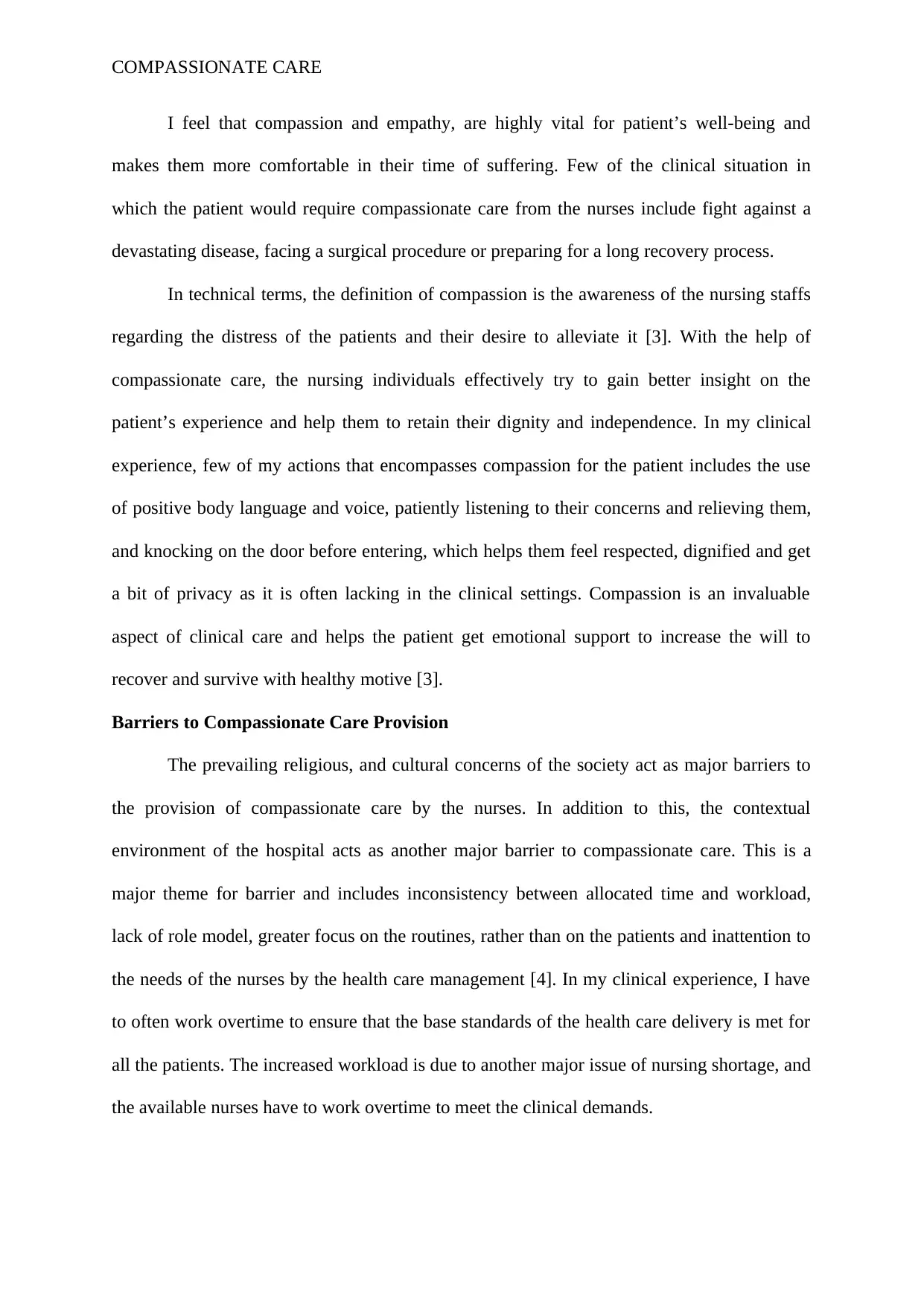
COMPASSIONATE CARE
I feel that compassion and empathy, are highly vital for patient’s well-being and
makes them more comfortable in their time of suffering. Few of the clinical situation in
which the patient would require compassionate care from the nurses include fight against a
devastating disease, facing a surgical procedure or preparing for a long recovery process.
In technical terms, the definition of compassion is the awareness of the nursing staffs
regarding the distress of the patients and their desire to alleviate it [3]. With the help of
compassionate care, the nursing individuals effectively try to gain better insight on the
patient’s experience and help them to retain their dignity and independence. In my clinical
experience, few of my actions that encompasses compassion for the patient includes the use
of positive body language and voice, patiently listening to their concerns and relieving them,
and knocking on the door before entering, which helps them feel respected, dignified and get
a bit of privacy as it is often lacking in the clinical settings. Compassion is an invaluable
aspect of clinical care and helps the patient get emotional support to increase the will to
recover and survive with healthy motive [3].
Barriers to Compassionate Care Provision
The prevailing religious, and cultural concerns of the society act as major barriers to
the provision of compassionate care by the nurses. In addition to this, the contextual
environment of the hospital acts as another major barrier to compassionate care. This is a
major theme for barrier and includes inconsistency between allocated time and workload,
lack of role model, greater focus on the routines, rather than on the patients and inattention to
the needs of the nurses by the health care management [4]. In my clinical experience, I have
to often work overtime to ensure that the base standards of the health care delivery is met for
all the patients. The increased workload is due to another major issue of nursing shortage, and
the available nurses have to work overtime to meet the clinical demands.
I feel that compassion and empathy, are highly vital for patient’s well-being and
makes them more comfortable in their time of suffering. Few of the clinical situation in
which the patient would require compassionate care from the nurses include fight against a
devastating disease, facing a surgical procedure or preparing for a long recovery process.
In technical terms, the definition of compassion is the awareness of the nursing staffs
regarding the distress of the patients and their desire to alleviate it [3]. With the help of
compassionate care, the nursing individuals effectively try to gain better insight on the
patient’s experience and help them to retain their dignity and independence. In my clinical
experience, few of my actions that encompasses compassion for the patient includes the use
of positive body language and voice, patiently listening to their concerns and relieving them,
and knocking on the door before entering, which helps them feel respected, dignified and get
a bit of privacy as it is often lacking in the clinical settings. Compassion is an invaluable
aspect of clinical care and helps the patient get emotional support to increase the will to
recover and survive with healthy motive [3].
Barriers to Compassionate Care Provision
The prevailing religious, and cultural concerns of the society act as major barriers to
the provision of compassionate care by the nurses. In addition to this, the contextual
environment of the hospital acts as another major barrier to compassionate care. This is a
major theme for barrier and includes inconsistency between allocated time and workload,
lack of role model, greater focus on the routines, rather than on the patients and inattention to
the needs of the nurses by the health care management [4]. In my clinical experience, I have
to often work overtime to ensure that the base standards of the health care delivery is met for
all the patients. The increased workload is due to another major issue of nursing shortage, and
the available nurses have to work overtime to meet the clinical demands.
⊘ This is a preview!⊘
Do you want full access?
Subscribe today to unlock all pages.

Trusted by 1+ million students worldwide
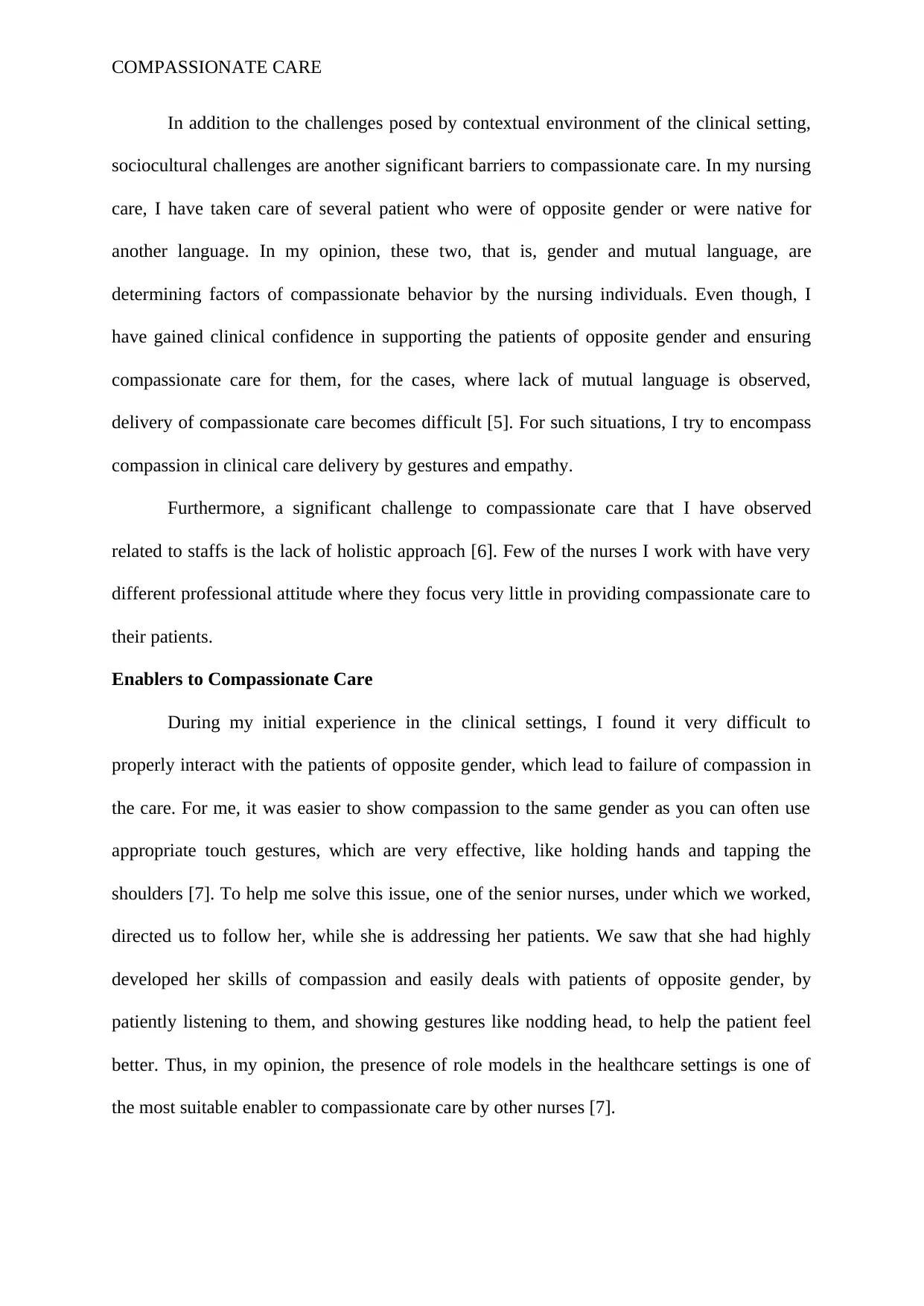
COMPASSIONATE CARE
In addition to the challenges posed by contextual environment of the clinical setting,
sociocultural challenges are another significant barriers to compassionate care. In my nursing
care, I have taken care of several patient who were of opposite gender or were native for
another language. In my opinion, these two, that is, gender and mutual language, are
determining factors of compassionate behavior by the nursing individuals. Even though, I
have gained clinical confidence in supporting the patients of opposite gender and ensuring
compassionate care for them, for the cases, where lack of mutual language is observed,
delivery of compassionate care becomes difficult [5]. For such situations, I try to encompass
compassion in clinical care delivery by gestures and empathy.
Furthermore, a significant challenge to compassionate care that I have observed
related to staffs is the lack of holistic approach [6]. Few of the nurses I work with have very
different professional attitude where they focus very little in providing compassionate care to
their patients.
Enablers to Compassionate Care
During my initial experience in the clinical settings, I found it very difficult to
properly interact with the patients of opposite gender, which lead to failure of compassion in
the care. For me, it was easier to show compassion to the same gender as you can often use
appropriate touch gestures, which are very effective, like holding hands and tapping the
shoulders [7]. To help me solve this issue, one of the senior nurses, under which we worked,
directed us to follow her, while she is addressing her patients. We saw that she had highly
developed her skills of compassion and easily deals with patients of opposite gender, by
patiently listening to them, and showing gestures like nodding head, to help the patient feel
better. Thus, in my opinion, the presence of role models in the healthcare settings is one of
the most suitable enabler to compassionate care by other nurses [7].
In addition to the challenges posed by contextual environment of the clinical setting,
sociocultural challenges are another significant barriers to compassionate care. In my nursing
care, I have taken care of several patient who were of opposite gender or were native for
another language. In my opinion, these two, that is, gender and mutual language, are
determining factors of compassionate behavior by the nursing individuals. Even though, I
have gained clinical confidence in supporting the patients of opposite gender and ensuring
compassionate care for them, for the cases, where lack of mutual language is observed,
delivery of compassionate care becomes difficult [5]. For such situations, I try to encompass
compassion in clinical care delivery by gestures and empathy.
Furthermore, a significant challenge to compassionate care that I have observed
related to staffs is the lack of holistic approach [6]. Few of the nurses I work with have very
different professional attitude where they focus very little in providing compassionate care to
their patients.
Enablers to Compassionate Care
During my initial experience in the clinical settings, I found it very difficult to
properly interact with the patients of opposite gender, which lead to failure of compassion in
the care. For me, it was easier to show compassion to the same gender as you can often use
appropriate touch gestures, which are very effective, like holding hands and tapping the
shoulders [7]. To help me solve this issue, one of the senior nurses, under which we worked,
directed us to follow her, while she is addressing her patients. We saw that she had highly
developed her skills of compassion and easily deals with patients of opposite gender, by
patiently listening to them, and showing gestures like nodding head, to help the patient feel
better. Thus, in my opinion, the presence of role models in the healthcare settings is one of
the most suitable enabler to compassionate care by other nurses [7].
Paraphrase This Document
Need a fresh take? Get an instant paraphrase of this document with our AI Paraphraser
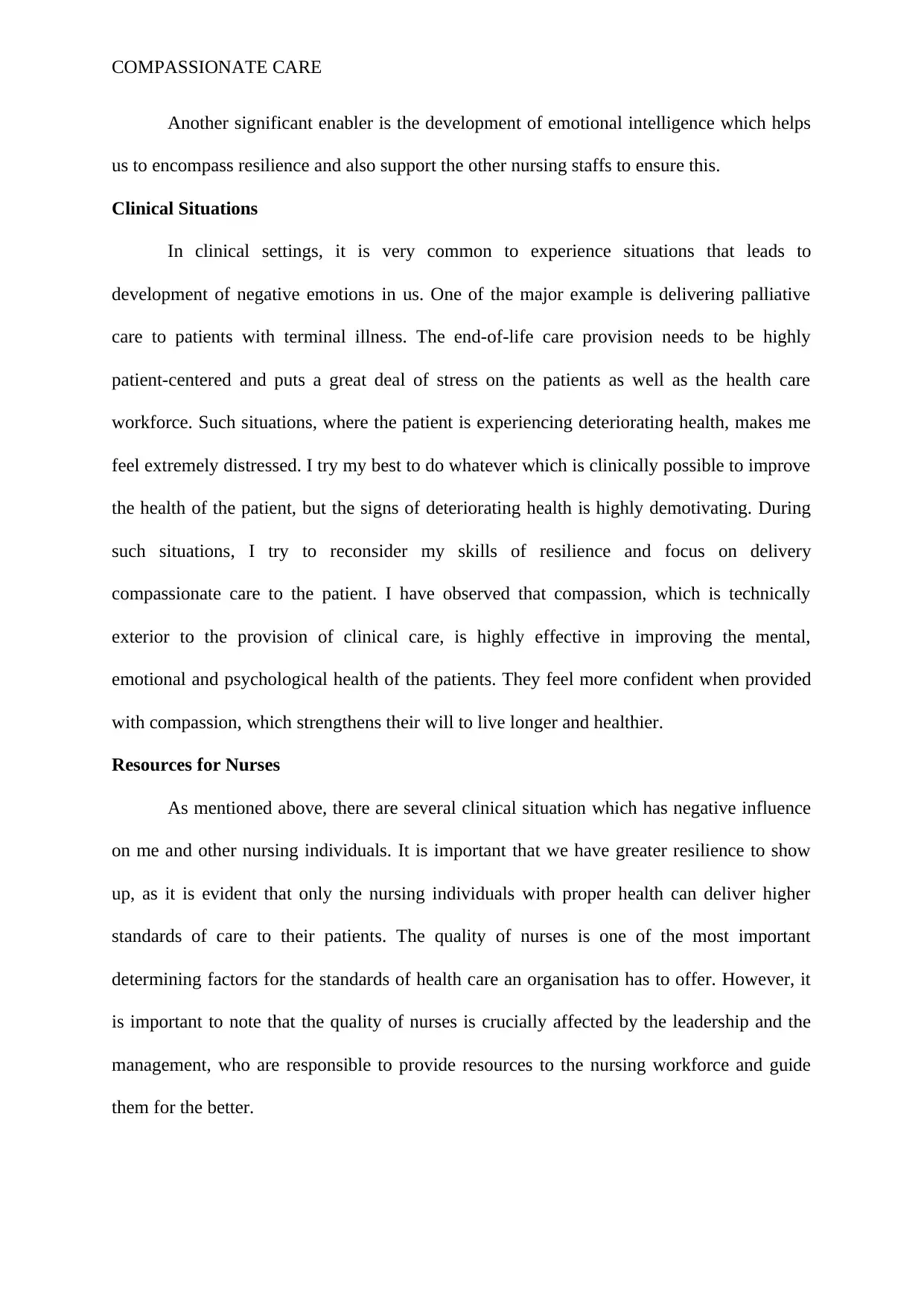
COMPASSIONATE CARE
Another significant enabler is the development of emotional intelligence which helps
us to encompass resilience and also support the other nursing staffs to ensure this.
Clinical Situations
In clinical settings, it is very common to experience situations that leads to
development of negative emotions in us. One of the major example is delivering palliative
care to patients with terminal illness. The end-of-life care provision needs to be highly
patient-centered and puts a great deal of stress on the patients as well as the health care
workforce. Such situations, where the patient is experiencing deteriorating health, makes me
feel extremely distressed. I try my best to do whatever which is clinically possible to improve
the health of the patient, but the signs of deteriorating health is highly demotivating. During
such situations, I try to reconsider my skills of resilience and focus on delivery
compassionate care to the patient. I have observed that compassion, which is technically
exterior to the provision of clinical care, is highly effective in improving the mental,
emotional and psychological health of the patients. They feel more confident when provided
with compassion, which strengthens their will to live longer and healthier.
Resources for Nurses
As mentioned above, there are several clinical situation which has negative influence
on me and other nursing individuals. It is important that we have greater resilience to show
up, as it is evident that only the nursing individuals with proper health can deliver higher
standards of care to their patients. The quality of nurses is one of the most important
determining factors for the standards of health care an organisation has to offer. However, it
is important to note that the quality of nurses is crucially affected by the leadership and the
management, who are responsible to provide resources to the nursing workforce and guide
them for the better.
Another significant enabler is the development of emotional intelligence which helps
us to encompass resilience and also support the other nursing staffs to ensure this.
Clinical Situations
In clinical settings, it is very common to experience situations that leads to
development of negative emotions in us. One of the major example is delivering palliative
care to patients with terminal illness. The end-of-life care provision needs to be highly
patient-centered and puts a great deal of stress on the patients as well as the health care
workforce. Such situations, where the patient is experiencing deteriorating health, makes me
feel extremely distressed. I try my best to do whatever which is clinically possible to improve
the health of the patient, but the signs of deteriorating health is highly demotivating. During
such situations, I try to reconsider my skills of resilience and focus on delivery
compassionate care to the patient. I have observed that compassion, which is technically
exterior to the provision of clinical care, is highly effective in improving the mental,
emotional and psychological health of the patients. They feel more confident when provided
with compassion, which strengthens their will to live longer and healthier.
Resources for Nurses
As mentioned above, there are several clinical situation which has negative influence
on me and other nursing individuals. It is important that we have greater resilience to show
up, as it is evident that only the nursing individuals with proper health can deliver higher
standards of care to their patients. The quality of nurses is one of the most important
determining factors for the standards of health care an organisation has to offer. However, it
is important to note that the quality of nurses is crucially affected by the leadership and the
management, who are responsible to provide resources to the nursing workforce and guide
them for the better.
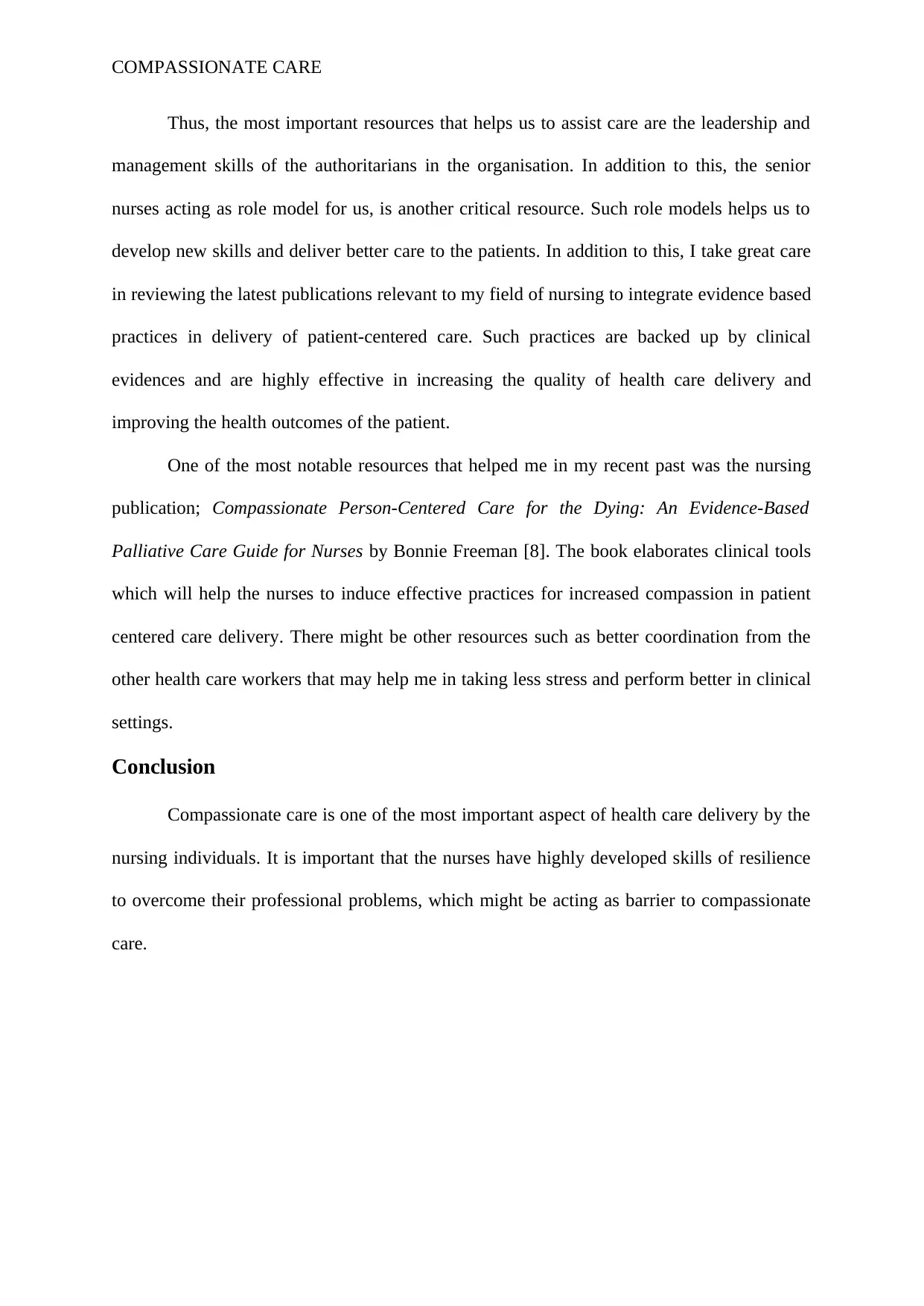
COMPASSIONATE CARE
Thus, the most important resources that helps us to assist care are the leadership and
management skills of the authoritarians in the organisation. In addition to this, the senior
nurses acting as role model for us, is another critical resource. Such role models helps us to
develop new skills and deliver better care to the patients. In addition to this, I take great care
in reviewing the latest publications relevant to my field of nursing to integrate evidence based
practices in delivery of patient-centered care. Such practices are backed up by clinical
evidences and are highly effective in increasing the quality of health care delivery and
improving the health outcomes of the patient.
One of the most notable resources that helped me in my recent past was the nursing
publication; Compassionate Person-Centered Care for the Dying: An Evidence-Based
Palliative Care Guide for Nurses by Bonnie Freeman [8]. The book elaborates clinical tools
which will help the nurses to induce effective practices for increased compassion in patient
centered care delivery. There might be other resources such as better coordination from the
other health care workers that may help me in taking less stress and perform better in clinical
settings.
Conclusion
Compassionate care is one of the most important aspect of health care delivery by the
nursing individuals. It is important that the nurses have highly developed skills of resilience
to overcome their professional problems, which might be acting as barrier to compassionate
care.
Thus, the most important resources that helps us to assist care are the leadership and
management skills of the authoritarians in the organisation. In addition to this, the senior
nurses acting as role model for us, is another critical resource. Such role models helps us to
develop new skills and deliver better care to the patients. In addition to this, I take great care
in reviewing the latest publications relevant to my field of nursing to integrate evidence based
practices in delivery of patient-centered care. Such practices are backed up by clinical
evidences and are highly effective in increasing the quality of health care delivery and
improving the health outcomes of the patient.
One of the most notable resources that helped me in my recent past was the nursing
publication; Compassionate Person-Centered Care for the Dying: An Evidence-Based
Palliative Care Guide for Nurses by Bonnie Freeman [8]. The book elaborates clinical tools
which will help the nurses to induce effective practices for increased compassion in patient
centered care delivery. There might be other resources such as better coordination from the
other health care workers that may help me in taking less stress and perform better in clinical
settings.
Conclusion
Compassionate care is one of the most important aspect of health care delivery by the
nursing individuals. It is important that the nurses have highly developed skills of resilience
to overcome their professional problems, which might be acting as barrier to compassionate
care.
⊘ This is a preview!⊘
Do you want full access?
Subscribe today to unlock all pages.

Trusted by 1+ million students worldwide
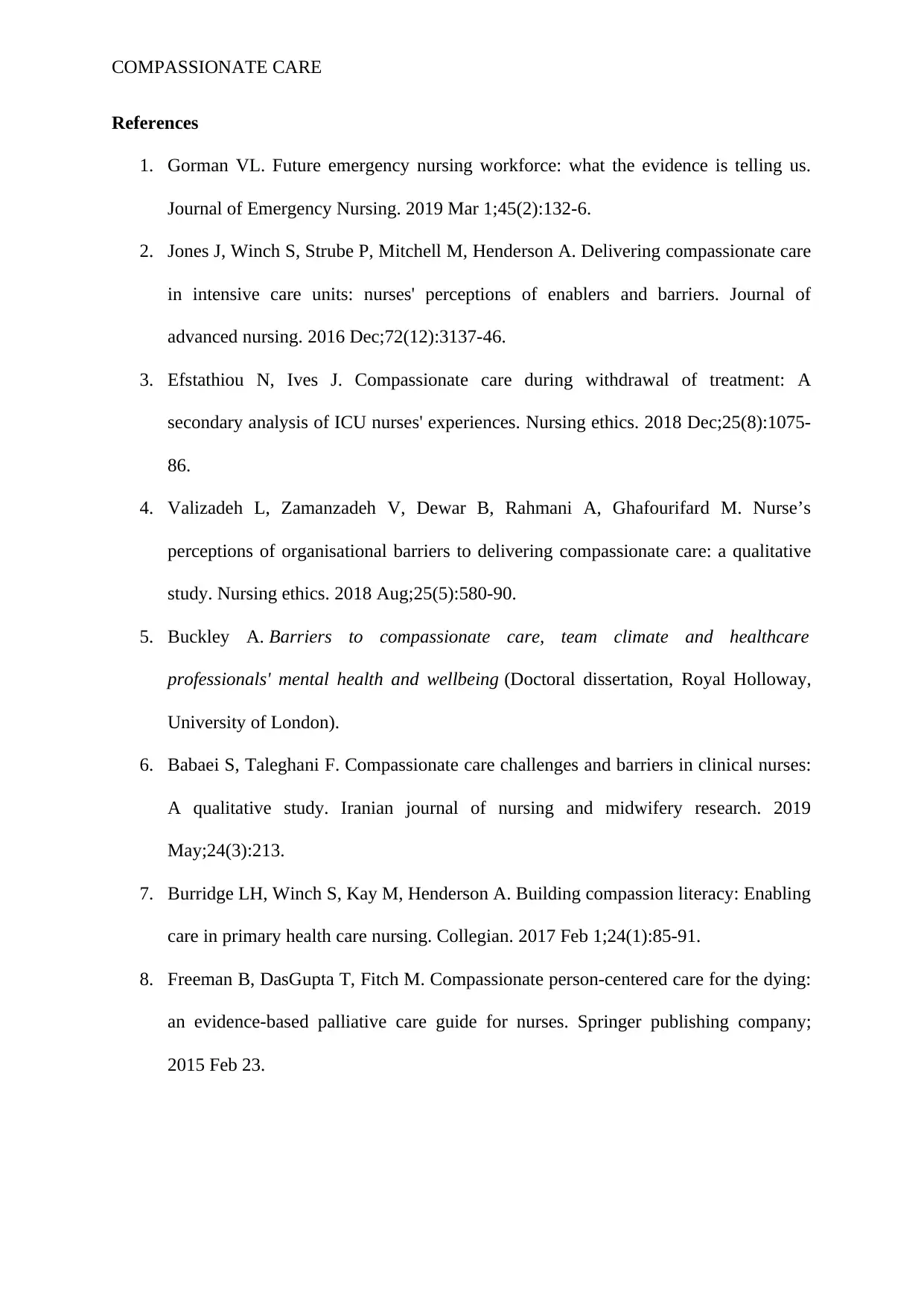
COMPASSIONATE CARE
References
1. Gorman VL. Future emergency nursing workforce: what the evidence is telling us.
Journal of Emergency Nursing. 2019 Mar 1;45(2):132-6.
2. Jones J, Winch S, Strube P, Mitchell M, Henderson A. Delivering compassionate care
in intensive care units: nurses' perceptions of enablers and barriers. Journal of
advanced nursing. 2016 Dec;72(12):3137-46.
3. Efstathiou N, Ives J. Compassionate care during withdrawal of treatment: A
secondary analysis of ICU nurses' experiences. Nursing ethics. 2018 Dec;25(8):1075-
86.
4. Valizadeh L, Zamanzadeh V, Dewar B, Rahmani A, Ghafourifard M. Nurse’s
perceptions of organisational barriers to delivering compassionate care: a qualitative
study. Nursing ethics. 2018 Aug;25(5):580-90.
5. Buckley A. Barriers to compassionate care, team climate and healthcare
professionals' mental health and wellbeing (Doctoral dissertation, Royal Holloway,
University of London).
6. Babaei S, Taleghani F. Compassionate care challenges and barriers in clinical nurses:
A qualitative study. Iranian journal of nursing and midwifery research. 2019
May;24(3):213.
7. Burridge LH, Winch S, Kay M, Henderson A. Building compassion literacy: Enabling
care in primary health care nursing. Collegian. 2017 Feb 1;24(1):85-91.
8. Freeman B, DasGupta T, Fitch M. Compassionate person-centered care for the dying:
an evidence-based palliative care guide for nurses. Springer publishing company;
2015 Feb 23.
References
1. Gorman VL. Future emergency nursing workforce: what the evidence is telling us.
Journal of Emergency Nursing. 2019 Mar 1;45(2):132-6.
2. Jones J, Winch S, Strube P, Mitchell M, Henderson A. Delivering compassionate care
in intensive care units: nurses' perceptions of enablers and barriers. Journal of
advanced nursing. 2016 Dec;72(12):3137-46.
3. Efstathiou N, Ives J. Compassionate care during withdrawal of treatment: A
secondary analysis of ICU nurses' experiences. Nursing ethics. 2018 Dec;25(8):1075-
86.
4. Valizadeh L, Zamanzadeh V, Dewar B, Rahmani A, Ghafourifard M. Nurse’s
perceptions of organisational barriers to delivering compassionate care: a qualitative
study. Nursing ethics. 2018 Aug;25(5):580-90.
5. Buckley A. Barriers to compassionate care, team climate and healthcare
professionals' mental health and wellbeing (Doctoral dissertation, Royal Holloway,
University of London).
6. Babaei S, Taleghani F. Compassionate care challenges and barriers in clinical nurses:
A qualitative study. Iranian journal of nursing and midwifery research. 2019
May;24(3):213.
7. Burridge LH, Winch S, Kay M, Henderson A. Building compassion literacy: Enabling
care in primary health care nursing. Collegian. 2017 Feb 1;24(1):85-91.
8. Freeman B, DasGupta T, Fitch M. Compassionate person-centered care for the dying:
an evidence-based palliative care guide for nurses. Springer publishing company;
2015 Feb 23.
1 out of 7
Related Documents
Your All-in-One AI-Powered Toolkit for Academic Success.
+13062052269
info@desklib.com
Available 24*7 on WhatsApp / Email
![[object Object]](/_next/static/media/star-bottom.7253800d.svg)
Unlock your academic potential
Copyright © 2020–2026 A2Z Services. All Rights Reserved. Developed and managed by ZUCOL.





